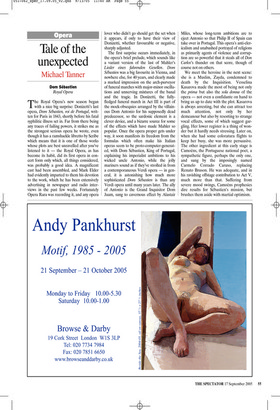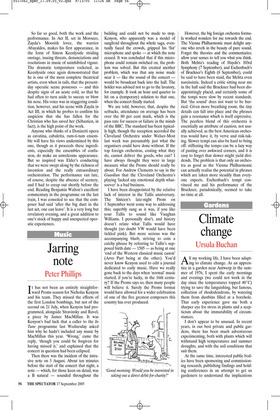Tale of the unexpected
Michael Tanner
Dom Sébastien Royal Opera The Royal Opera’s new season began with a nice big surprise: Donizetti’s last opera, Dom Sébastien, roi de Portugal, written for Paris in 1843, shortly before his fatal syphilitic illness set in. Far from there being any traces of failing powers, it strikes me as the strongest serious opera he wrote, even though it has a ramshackle libretto by Scribe which means that it is one of those works whose plots are best unravelled after you’ve listened to it — the Royal Opera, as has become its habit, did its first opera in concert form only which, all things considered, was probably a good idea. A magnificent cast had been assembled, and Mark Elder had evidently imparted to them his devotion to the work, which he has been extensively advertising in newspaper and radio interviews in the past few weeks. Fortunately Opera Rara was recording it, and any opera lover who didn’t go should get the set when it appears, if only to have their view of Donizetti, whether favourable or negative, sharply adjusted.
The first surprise occurs immediately, in the opera’s brief prelude, which sounds like a variant version of the last of Mahler’s Lieder eines fahrenden Gesellen. Dom Sébastien was a big favourite in Vienna, and nowhere else, for 40 years, and clearly made a marked impression on the arch-purveyor of funeral marches with major-minor oscillations and unnerving mixtures of the banal and the tragic. In Donizetti, the fullyfledged funeral march in Act III is part of the mock-obsequies arranged by the villainous Dom Antonio for his supposedly dead predecessor, so the sardonic element is a clever device, and a bizarre source for some of the effects which have made Mahler so popular. Once the opera proper gets under way, it soon manifests its freedom from the formulas which often make his Italian operas seem to be proto-computer-generated, with Dom Sébastien, King of Portugal, explaining his imperialist ambitions to his wicked uncle Antonio, while the jolly mariners sound as if they’ve strolled in from a contemporaneous Verdi opera — in general, it is astonishing how much more sophisticated Dom Sébastien is than any Verdi opera until many years later. The ally of Antonio is the Grand Inquisitor Dom Juam, sung to cavernous effect by Alastair Miles, whose long-term ambitions are to eject Antonio so that Philip II of Spain can take over in Portugal. This opera’s anti-clericalism and unabashed portrayal of religions as primarily agents of violence and corruption are so powerful that it steals all of Don Carlos’s thunder on that score, though of course not on others.
We meet the heroine in the next scene: she is a Muslim, Zayda, condemned to death by the Inquisition. Vesselina Kasarova made the most of being not only the prima but also the sola donna of the opera — not even a confidante on hand to bring us up to date with the plot. Kasarova is always arresting, but she can attract too much attention, not only by her demeanour but also by resorting to strange vocal effects, some of which suggest gargling. Her lower register is a thing of wonder but it hardly needs stressing. Later on, when she had some coloratura flights to keep her busy, she was more persuasive. The other ingredient at this early stage is Camoëns, the Portuguese national poet, a sympathetic figure, perhaps the only one, and sung by the imposingly named Carmelo Corrado Caruso, replacing Renato Bruson. He was adequate, and in his ravishing offstage contribution to Act V, much more than that. Suffering from severe mood swings, Camoëns prophesies dire results for Sébastien’s mission, but brushes them aside with martial optimism. So far so good, both the work and the performance. In Act II, set in Morocco, Zayda’s Moorish lover, the warrior Abayaldos, makes his first appearance, in the form of Simon Keenlyside striding onstage, issuing threats, denunciations and resolutions in music of uninhibited vigour. The dramatic temperature rocketed, as Keenlyside once again demonstrated that he is one of the most complete theatrical artists, even when in tails, that the presentday operatic scene possesses — and this despite signs of an acute cold, so that he had often to turn aside to sneeze or blow his nose. His voice was in staggering condition, however, and his scene with Zayda in Act III, in which he probes to confirm his suspicion that she has fallen for the Christian who has saved her (Sébastien, in fact), is the high point of the work.
Anyone who thinks of a Donizetti opera as cavatina, cabaletta, rum-ti-tum ensemble will have his views undermined by this one, though as it proceeds these ingredients, especially the ensembles of confusion, do make an unwelcome appearance. But so inspired was Elder’s conducting that we were swept along by the richness of invention and the really extraordinary orchestration. The performance ran late, of course, despite the absence of scenery, and I had to creep out shortly before the end. Reading Benjamin Walton’s excellent commentary in the programme on the last train, I was consoled to see that the composer had said ‘after the big duet in the last act, one can leave’. It is a very long but revelatory evening, and a great addition to one’s stock of happy and unexpected operatic experiences.




















































 Previous page
Previous page